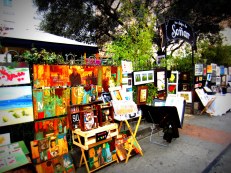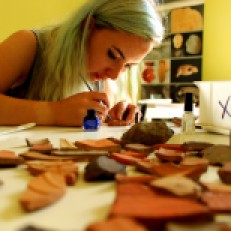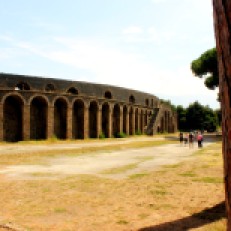Language
Madrid Diaries: Unemployed but Happy
“I’ve learned that making a ‘living’ is not the same thing as making a ‘life.’” ~ Maya Angelou
Whenever I meet somebody new and they find out, during the course of the conversation, that I’ve been jobless for over one year, living in a foreign country where I have no family or prior acquaintances, and where I just barely speak the language, they look at me incredulously, stupefied: “But what do you do all day? How do you survive? Aren’t you bored to death?”
Let me just mention here that my lack of gainful employment has little to do with laziness, unwillingness, or the “handsome fortune” I may possess, and mostly to do with my legal status in Spain (residencia sin trabajo – residency without work), coupled with the language barrier (dam, rather) that I’m still slowly chipping away at.
But I find it odd, the amount of importance people attach to what you “do” for a living. I myself used to be one of those people: ever since college, I had never been without a job of some sort, full-time, part-time, internship, fellowship, what have you. Even though I wasn’t particularly ambitious or “career-driven”, I took pride in the work I did, because I saw it as a “productive” use of my time, as a contribution towards my own financial wellbeing, and as a logical step forward in my profession, another glittering addition to my resume. And, even if none of that held true, at least I would have a response to that piquing, unrelenting question, the backbone of social banter – “So, what do you do?” I could define myself in one neat, clean, impressive title, and immediately win the other person’s respect. That felt good.
So what happened when I followed my Erasmus Mundus PhD candidate-better half to Spain? What happened when the prospect of landing a job of any kind – let alone related to my career – was suddenly as bright as a Lahori home on a sticky summer’s night? (non-Lahoris/Pakistanis, look up “load shedding” on Wikipedia!)
Well, like any respectably assiduous person, I was frustrated; frustrated with my lack of “productiveness”, uncomfortable with my own free time, guilty of spending money when I wasn’t earning any, guilty of letting my Berkeley Master’s degree “go to waste”; apologetic of my “situation” in general, sighing deeply and resignedly whenever the topic came up…
But the truth is – I wasn’t unhappy. Six months down the line, I was pretty darn happy, and far, far from bored. Society tends to evaluate people based on degrees, paychecks, publications, trophies, on solid, tangible proofs of “success” and one-word descriptions of what they “do for a living”. “I’m a doctor – actor – teacher – writer – cleaner – waiter …” As if nothing exists beyond the ambit of those rectangular brackets.
But we are so, so much more than what we do. The tragic part is that most people never have the time, the opportunity or the motivation to explore themselves beyond the one-word labels, to spill out over the edges of their rectangular holes. I figured: I’m here in this fantastic European city, lucky enough to have time, opportunity and buckets of motivation – could I really complain about my “situation”?
Now, when someone asks me the invariable, the pedestrian, “So, what do you do?”, I cheerfully reply, “Well, I’m currently employed with living”, and present to them the following list:
1. Dance
Apart from taking regular classes at the Karnak School of Oriental Dance in Madrid, I started teaching Bollywood Dance earlier this year with Tara, my partner-in-crime from across the Wagah border. Our group, Mantara, recently performed at a Diwali Dance Fiesta, where our lovely alumnas did splendidly well. Throw in Indo-Pak feasts at the local (Bangladeshi) restaurants and mini-dholkis at my house, complete with mehndi (henna), chai, retro Bollywood music videos and Coke Studio Pakistan, and home doesn’t feel so far away!
2. Song
I also recently joined Voces de Ida y Vuelta, a multicultural, multlingual choir that performs at local fundraisers and charity events. Grouped with the sopranos, I’m currently working on reaching glass-shattering pitches and memorizing Cuban, Chilean, Brazilian and Gabonese songs, with many more canciones to come – including one from Pakistan!
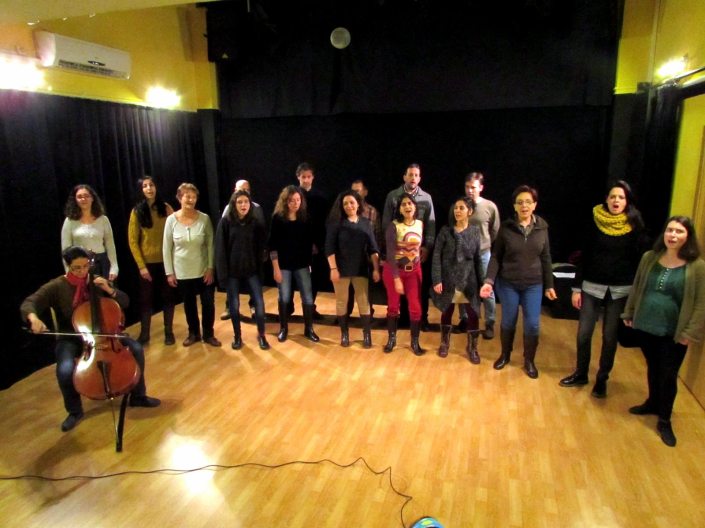
3. Art
I don’t “make” art (unless you count photography), but Madrid is such a fantastic place to see and appreciate all kinds of art – for free! – that you can’t help soaking it up every day, as you casually stroll through an exhibition at the neighbourhood gallery or at a random cafe, at the former Post Office, the one-time slaughterhouse or tobacco factory, at Retiro Park, or in the graffitied alleys of Malasaña. Over the course of my artistic education in Madrid, I’ve decided that I don’t particularly like (or understand) Picasso, but Dali I find fascinating (though I don’t fully understand him either). I’ve also decided that if a painting looks too much like a photograph, then it isn’t a good painting. There, my two cents of artistic wisdom!
4. Archaeology
Following up on an old dream (not inspired by Indiana Jones!), I volunteered for an archaeological excavation (read: labour camp) this summer, in the small town of Pollena Trocchia in the south of Italy. Together with 20 bright-faced archaeology undergrads from the U.S., U.K., Canada and Europe (I had to represent the brown people of the world), I dug, scraped, shoveled, pick-axed, sifted, wheelbarrowed and rolled around in incalculable amounts of volcanic soil at the site of an ancient Roman Bathhouse and Villa, destroyed in 472 C.E. by the eruption of Mount Vesuvius. Needless to say, working as a mazdoor under the hot Neapolitan sun and living like a mazdoor (10 perpetually filthy people sharing a perpetually filthy dorm and bathroom) gave me a whole new appreciation of the academic world, of airconditioned libraries and sparkly-floored museums, not to mention of my own sparkling bedroom and bathroom. But, inspite of it being one of the most physically challenging things I have done in my life, I’m not “cured” of my archaeology illusions quite yet!
5. Food
I’ve always been fond of tinkering around in the kitchen, and every new place inspires you to add new dishes to your repertoire. So, apart from the classic spaghetti bolognese (Pakistani style), the best Thai Green Curry you’ll ever have this side of the Pacific, and my special death-by-chocolate brownies, here are some other hearty goodies you’ll get to sample at Casa Manal. (Note: These photos are not my own, but I swear, the food looks just like this!)
6. Park
If there’s one place we’ve spent more time in Madrid than any other, it’s Retiro Park. Madrid’s main park used to be a retiro, a retreat for Spanish royals until the late 19th century, when it was opened to the public. It’s big, it’s beautiful, and you can do absolutely anything you want there, from running, biking, rollerblading, boating and gyming to yoga, tai chee, frisbee, slacklining, dancing (thanks to us!), to watching magic shows, puppets and live music, seeing art exhibitions, enjoying a coffee, lemonade or sangria (whichever you prefer), to dozing quietly in a shady corner – a little piece of paradise in the heart of Madrid.
7. Language
Apart from continuing Spanish classes at C.E.E. Idiomas and regular intercambio coffee dates with my Spanish girl friends, I’ve added a new item to the daily study regimen – Spanish TV soaps. I’ve never been much of a TV buff, but there’s a certain pleasure in ensconcing yourself on a sofa with a blanket and a box of cookies and watching a dramatic story of some other place and time unfold magically infront of your eyes on an HD TV screen. And here in Madrid, I have an excuse to watch all the TV I want! From the weighty life of Spanish “Reconquista” Queen Isabel to swashbuckling adventures in the Spanish American colonies to a feudal family drama set in a Franco-era Castillian village, I’ll be speaking the Queen’s (500 year-old diction of) Spanish in no time!
8. Volunteering
I joined the WWF (World Wildlife Fund) Madrid Volunteer Network shortly after arriving in the city, but was initally too scared to go to their weekly and monthly activities (tree plantings, bird censuses, plodding around marshes and other strange things that only me and my partner-in-crime from across the border would find enjoyable). We did make it to the Earth Hour event though, inspite of the pouring rain, proving our mettle as die-hard WWF supporters and being rewarded with Panda T-shirts. I plan to join the regular field activites as soon as the weather warms up, this time with reinforced Spanish!
9. Travel & Photography
Perhaps the best part about living in Europe is the travelling – within a few hours flight from Madrid I can be in any number of different European capitals, each with a different language, different architecture, food and feel. And if you plan in advance and are a savvy deal-hunter like I’ve become, the trip won’t cost you a euro more than it would have in your shoestring student-budget days.
But there’s so much to see in Spain itself that we haven’t yet been tempted by elaborate holidays abroad. I watch with satisfaction as the souvenir magnet collection on our fridge steadily grows, as do the number of photo archives on my computer. For me, travelling is pure thrill – every time I go to a bus terminal, a train station or an airport, I feel slightly giddy, as if I were 8 years old and about to step into Disneyland. Each time I’m wandering the streets of a new city, curiosity and a camera in hand, I feel that strange sense of belonging everywhere, yet of belonging nowhere.
And each time I travel, I’m reminded about how beautiful the world is, how diverse the world is, and how similar we all are – all of us humans, busily making lives and earning livings in whatever little patch of earth we call home. In the end, no matter what we do or don’t do, happiness doesn’t come to us. It flows from within.
“How to Make Friends in a New City” – Published on BootsnAll!
Dear readers,
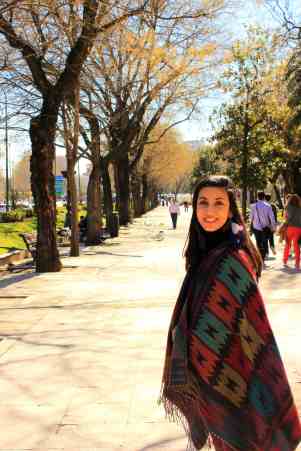
My recent series of blogposts, recounting my (mis)adventures as a fresh-off-the-boat expat in the splendid Spanish capital of Madrid, was published today as a feature article on BootsnAll, the largest and most popular online resource for independent travelers! Of course, I’m muy excited about it, and would love for you to read and share the article with your friends!
How to Make Friends in a Foreign City – Essential Tips from a Nueva Madrileña
And thanks as always for your patience with my protracted disappearances. I’ve been up to many things, and I’ll recount them to you in due time :)
Abrazos from Madrid,
Manal
How to Make Friends in a New City – Tip #4
- LANGUAGE EXCHANGE
Language exchange, or intercambio, is a popular (and free) method of learning languages in Spain. There was a plethora, a veritable sea of Spaniards out there, my Spanish teacher told me, who were desperate to find a sympathetic English-speaker to practice their hesitant conversational skills with. English is taught in Spanish schools as an optional second language, but in the most pedantic way possible, so that somebody who has “studied” English for over 10 years can barely formulate a coherent reply to a “Hi, what’s up?”
Kind of like how we were taught Pakistan History in secondary school. Once, in a surprise test, the teacher asked us to write an essay comparing the achievements and successes of two of Pakistan’s Prime Ministers. I started with the conventional introduction (memorized from the textbook, of course), ended with the conventional conclusion (we knew it like we knew our multiplication tables), and filled in the middle with a fictitious story, sprinkled with song lyrics. The result? 9/10, if you please, and a “Well Done!”
But, coming back to Spain – intercambio sounded like the perfect arrangement for me. Not only would it help my Spanish, I would also have somebody to chat with over a cup of coffee – that nameless, shadowy, friend-like figure I wanted so badly in Madrid! All I had to do was find somebody…
I immediately set to work. I went to tusclasesparticulares.com, created a profile, and posted an anuncio, an ad, stating my particulars in a cheerful, casual tone, and offering my stupendous English-speaking ability in exchange for un poco ayuda with my abysmal Spanish. We could meet in a cafe, or a park, como tu prefieres. I enjoyed photography, and writing, and meeting new people. Hoped to hear from you soon!
It almost felt like online dating, or shaadi.com. I went to bed that night with a flutter of excitement in my heart. Who would read my ad? Who would reply? Would I like them?
But nothing could have prepared me for the deluge of emails I found in my inbox the next morning; messages from men and women of all ages, all walks of life, from the city of Madrid and beyond, asking for my hand as their intercambio partner.
I was terribly flattered – and a bit overwhelmed. There were just too many fish in the sea. I needed to focus, start being selective, separate the wheat from the chaff, as they say. So began Step 2 of the intercambio-partner-hunt: carefully reading every ‘applicant’s’ email to divine something about their personality (Does she sound too serious? Does he sound sleazy?), stalking them on Facebook and Twitter, examining any photos that turned up. Some applications were discarded immediately; for example, the 38 year-old pianist who sent me a tea-stained studio portrait of himself in a brown fedora and brown tweed suit, or the 18-year old Economics student whose entire album of Facebook profile pictures consisted of duck-faced selfies.
After I had completed the first shortlist, I sent an email to each selected ‘applicant’, requesting, somewhat discreetly, a 200-word personal statement: “So, what do you do? What have you studied? What are your hobbies? I think it’s important, for a successful intercambio, that we share some interests, don’t you agree?”
When the replies started coming in, I made a second shortlist. Emails that included the words “books”, “languages”, “cinema”, “outdoors”, “museums” and “dogs”, for instance, were directed to the “Yes” Folder, while emails with the words “motorbikes”, “shopping”, “clubbing” and “pop music” were immediately relegated to the “Rejects” Folder (no offense meant to motorbike aficionados, shopaholics and Katy Perry fans, it’s just that, I wouldn’t know what to say to you!).
Now came the hard part: the actual, face-to-face meeting! I made appointments with the final 10 candidates, to meet them at a public square or coffee shop – blind dates, really. We barely had any idea of what the other person even looked like. And anyone who has been on a blind date will know that the first meeting was absolutely crucial. It could make or break the budding relationship. Either you liked the person, or you didn’t. Either you wanted to see that person again, or you didn’t.
Sure, I had my share of disappointing dates. Some people, intimidatingly interesting on paper, were plain boring in real life. Some people lacked energy or enthusiasm (for which I always tended to overcompensate, resulting in the peculiar condition know as the “laughing headache”), and some people just didn’t speak. In these cases, I found silence to be the best way to politely “end” things. In other cases, I was forced to lie: “I’m sorry, I’ve found a job as a dogwalker and don’t have time to do intercambio anymore!”
But, with some people, it just clicked. Conversation flowed naturally, there was laughter on both sides, and you were perfectly at ease after the first five minutes. I met a medley of memorable characters – a lawyer, a psychologist, a biochemist, an astrophysicist – all more or less my age, warm, openminded, hardworking people from different parts of Spain, who somehow found time to meet me for intercambio in their 10-hour work days. Finally, I could stop! Stop the endless virtual interviews, the awkward blind dates, the cruel but inevitable rejections!
So, has language exchange made me fluent in Spanish? No. Has my Spanish improved? I’d like to think so, yes. But more importantly, I’ve found Spanish friends, and through them, an insight into Spain. They tell me their views on love, marriage, family, religion, politics, and I share with them my experiences growing up in Pakistan and living in the United States, two completely different worlds about which they are equally curious. It’s strange how two people, complete strangers in one moment, can go to speaking about their personal lives with the air of old friends in the next. It is something that happens always with expats – maybe out of the boldness that comes with being a foreigner, or maybe out of our intrinsic need to trust, to talk, to confide in a palpable human being, in a place where there are no givens, where we must build our life up from the ground.
Read Tip #1,Tip #2, Tip #3, Tip #5, and the introductory post of this series!How to Make Friends in a New City – Tip #1
- JOIN A LANGUAGE SCHOOL
Now, this may seem like an obvious thing to do if you move to a country where you don’t speak the local language (and no, ordering a burger or asking where the bathroom is does not count), especially if you plan to stay there for a couple of months or more.
But many expats and immigrants, particularly from my “brown” part of the world, prefer to muddle through daily life with vernacular scraps, picked up in various situations and locations, and, needless to say, grammatically atrocious. Coupled with histrionic gestures and deliberately choppy English, they manage to make themselves almost perfectly understood, albeit in a primitive, cave-man sort of way. “I-go-mercado, para shopping.” “This-seat-libre, por favor?” “Me gusta this movie. It is muy bien.” “Tiene scissors, chop-chop?”
The real barrier, though, is the cost of learning a language. Well-reputed language schools promise you many grand things – “Speak Spanish like a native in just six weeks! Three months to your dream job as a parasailing instructor in sun-filled Majorca! Looking for love in Spain? Let us teach you the language of loveee!” But they also require you to dig deep into your pockets for the bargain, which most immigrants cannot afford to do.
However, thanks to my avid habit of reading advertisements in the metro (and everywhere else), I came across a language school that was reasonably-priced, and only a five-minute walk from where we lived, near Puerta del Sol. Upon investigation, I discovered that C.E.E. Idiomas was indeed a legitimate language school, complete with an administrative office, three stories of classrooms, and plenty of bright-faced, noisy internationals crowding its narrow staircases – and not, as I had initially suspected, some sinister racket for trapping gullible foreigners on shoestring budgets.
My first day of class I was terribly excited. I’ve always been a bit of a nerd, and loved going to school as a kid. So, I picked out a crisp new Generation kurti, slipped on my favorite orange flats, tossed a purple notebook and Piano pen into my Democracy Now tote bag, and set off bouncing along to class. I wasn’t only going to learn Spanish. Nobody knew it, but I had other intentions. I was friend-hunting.
Unfortunately, my dream of finding a kindred spirit, sitting there waiting for me in the classroom – darkish hair, fairly tall, not unlike myself, whom I would then proceed to hug, and demand, “Where have you been all this time???” – did not quite materialize. None of the students were the right fit. Some were too old (grandmother), some were too young (just out of high school), some had too many responsibilities (committed housewife, mother of two school-goers), and some were just too foreign (Kentucky, USA?). There was only so much we could share or talk about.
But still, peeling off my pajamas and going to class everyday in the fresh morning air, interacting with corporal human beings apart from my husband and the Carrefour lady was admittedly very pleasant. Plus, our Spanish teacher was an absolute riot, and we spent most of the hour laughing, though we didn’t understand half of what she said. I was learning quite a lot, too, very useful and practical things (for example, the important distinction between ojo, eye, and ajo, garlic, which I had confused more than once at the grocery store: “Tiene salsa de ojo?” “Do you have eye sauce?”). And – how can I deny it – I loved being back in ‘school’!



















